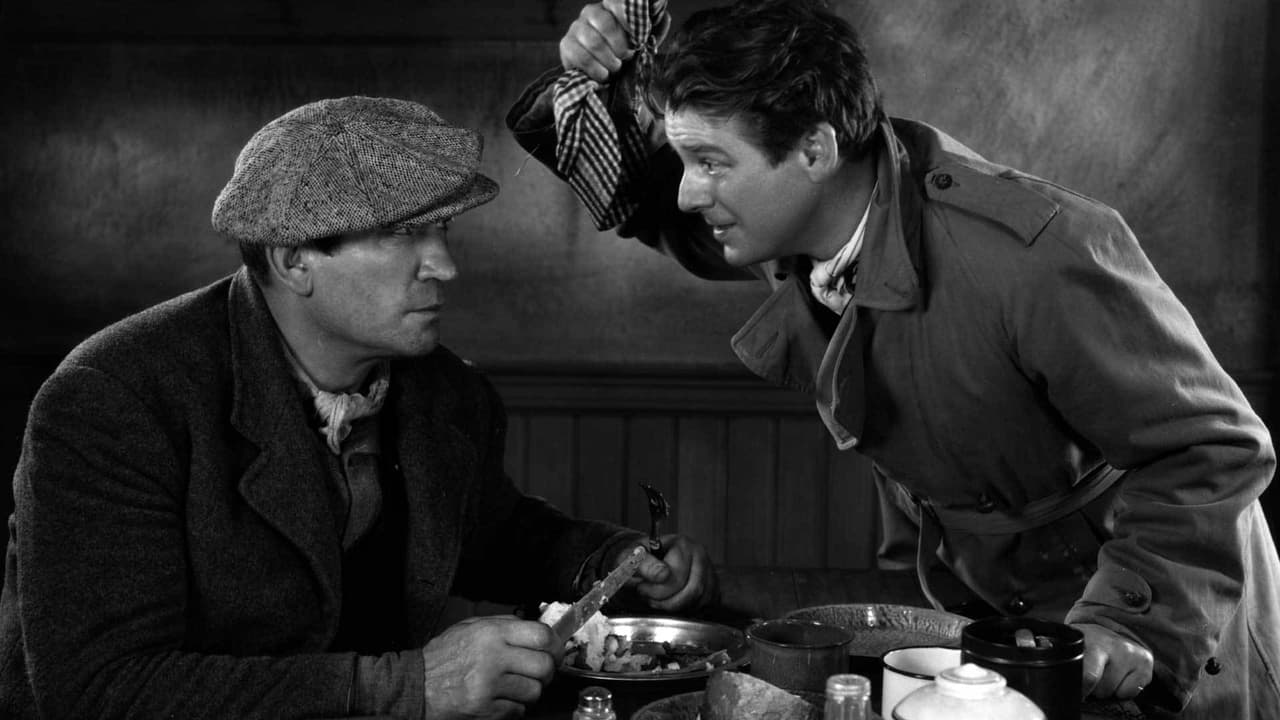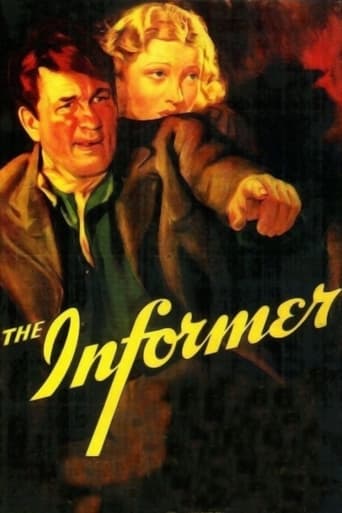

Yawn. Poorly Filmed Snooze Fest.
... View MoreIt isn't all that great, actually. Really cheesy and very predicable of how certain scenes are gonna turn play out. However, I guess that's the charm of it all, because I would consider this one of my guilty pleasures.
... View MoreOk... Let's be honest. It cannot be the best movie but is quite enjoyable. The movie has the potential to develop a great plot for future movies
... View MoreWhile it is a pity that the story wasn't told with more visual finesse, this is trivial compared to our real-world problems. It takes a good movie to put that into perspective.
... View MoreDirector: JOHN FORD. Screenplay: Dudley Nichols. Based on the 1925 novel by Liam O'Flaherty. Photography: Joseph August. Film editor: George Hively. Music: Max Steiner. Art directors: Van Nest Polglase, Charles Kirk. Set decorator: Julia Heron. Costumes: Walter Plunkett. Make-up: Robert J. Schiffer. Music orchestrations: Maurice DePackh, Bernard Kaun. Special effects: Harry Redmond. Sound editor: Robert Wise. Sound recording: Hugh McDowell, Jr. RCA Sound System. Associate producer: Cliff Reid.Copyright 24 May 1935 by RKO Radio Pictures, Inc. New York opening at the Radio City Music Hall 9 May 1935 (ran one week). U.S. release: 1 May 1935. U.K. release: October 1935. Australian release: 21 August 1935. 10 reels. 91 minutes.SYNOPSIS: Dublin, 1922. Irishman betrays a rebel to the police for the reward money.NOTES: Academy Award, Best Actor, Victor McLaglen (defeating a trio of nominees from Mutiny on the Bounty: Clark Gable, Charles Laughton and Franchot Tone).Academy Award, Directing, John Ford (defeating Henry Hathaway for Lives of a Bengal Lancer, and Frank Lloyd for Mutiny on the Bounty). Academy Award, Screenplay, Dudley Nichols (defeating Lives of a Bengal Lancer and Mutiny on the Bounty).Academy Award, Best Music Score, Max Steiner (defeating Herbert Stothart's Mutiny on the Bounty, and Ernst Toch's Peter Ibbetson). Also nominated for Best Picture (Mutiny on the Bounty), and Film Editing (A Midsummer Night's Dream).Best Motion Picture of 1935 — New York Film Critics. Best Direction, John Ford — New York Film Critics. Number 3 (after David Copperfield and Lives of a Bengal Lancer) on the Film Daily annual poll of U.S. film critics.Negative cost: $243,000. (Ford shot the entire film in 17 days).Re-make of a 1929 British silent starring Lars Hansen as Gypo, Warwick Ward as Dan Gallagher, and Lya de Putti as Katie Fox (Gypo's mistress with whom he wrongly suspects Frankie McPhillip is having an affair. This is the reason Gypo betrays Frankie to the police). The film, scripted by Benn W. Levy and Rolfe E. Vanlo, was directed by Arthur Robinson.Re-made in 1968 by director Jules Dassin as Uptight!COMMENT: Unfortunately, "The Informer" doesn't stand up terribly well. August's shadowy photography still looks marvelous, but we are less impressed by the over-use of symbolism (count up how many times we see the "Frankie McPhillip Wanted for Murder" poster superimposed over the Twenty Pounds), and the over-talkative, getting-no-place circular dialogue — especially when that dialogue is delivered by amateurish players like the stolidly stiff Preston Foster and the hammy Victor McLaglen (pronounced "mack-lock-len"). The opening scenes are saved by August's appealingly atmospheric photography and Ford's intuitive sense of drama and vibrant mise en scene. Fortunately, that charismatic actor, J. M. Kerrigan, is on hand for the middle portion of the film. But try as they might, neither Ford nor August can save the last third of the picture from Nichols' jejeune dialogue and McLaglen's excesses. Steiner's score too is at its most forceful in the first half and tends to overly "Mickey Mouse" the climax.
... View More"The Informer" is like a film noir before film noir even existed.John Ford directed this arty film about an Irishman who rats out a friend for 20 pounds during the Irish troubles in the 1920s. It's a character study of a dumb lunkhead who wants to be a big man in the eyes of his compatriots but isn't a real man in any of the ways that actually matter. The film looks fantastic, full of fog and atmospheric shadows, and visually Ford keeps it endlessly fascinating.One wishes his skill as a director had extended to his actors as well. Victor McLaglen, who plays the informer, gives an obnoxious, one-note performance, one prolonged drunken shout. And Margot Grahame, as his girl and the one who he steals the money for, is overwrought. The film is still more than worth a watch, but its effectiveness is hampered by the performances in it. Only one performance, that of the ubiquitous Una O'Connor's as the mother of McLaglen's dead friend, stands out."The Informer" won four Academy Awards in 1935, the most wins for any film that year, including Best Director for Ford, Best Actor for McLaglen, Best Screenplay for Dudley Nichols and Best Scoring for Max Steiner. But it somehow managed to lose the Best Picture Oscar to "Mutiny on the Bounty," which, though the most nominated film of the year, was the third and final film to date to win Best Picture without winning any other awards. One of the stranger Oscar years.Grade: A-
... View MoreJohn Ford had the knack like no one else of turning his films into poetry. It's visual, expressionistic and above all human poetry, since he had a very delicate understanding of human nature. This most clearly comes forth in his Irish films. His parents were from Ireland, and when he embarks on Irish or related subjects (like Wales) he does it with a very a intimate relationship and touch with his people and story. He makes human nature emerge almost titanically even when it's only about very ordinary people.In this film the so called hero is an extreme antihero. He has and does everything wrong. He is big and superior but only in muscles and size, while his brains are completely lacking - he doesn't know at all what he is doing but acts only on impulse and thus unawares brings his own tragedy.His long and great fall is tremendous. He is the buddy of a freedom fighter, and his one desire is for a certain common lady called Katie, with whom he wants to go to America away from the political disturbances and atrocities going on in Ireland in 1922. Without job and at odds with both the English and his own freedom organization, he desperately clinches at the possibility of getting money quick, by informing on his buddy. Naturally there are consequences.As he is completely irresponsible, he has no idea of what havoc he is causing in putting his own life at risk, which he cares least about of all. He gets his money, but instead of going to Katie and buying his freedom ticket, he wastes it all on a merry-go-round hullabaloo along the pubs of Dublin.Victor McLaglen makes an awesome figure in this tremendous and very Irish drama, that couldn't be more Irish. Carol Reed was much influenced by this film in making his masterpiece "Odd Man Out" twelve years later, and there are many interesting parallels between the films.To this comes the music. In the silents the composers learned the art of making the music enhance the drama of the films, and in this film that art is celebrating triumphs. It's almost as if Max Steiner's music underlines every action and every conversation in the drama.This is the perfect Irish film. That's the least you can say about it.
... View MoreIn "The Informer", John Ford works his magic by giving us a dark and moody masterpiece limited by the low budget for the film. The low production values are "masked" by creative lighting and strategically placed fog to cover the shortcomings of the set pieces.Victor McLaglen in an Oscar winning performance, plays Gypo Nolan a dim witted big oaf of a man in 1922 Ireland who is wandering the streets of Dublin broke and disillusioned. He laments that the British think that he is with the Irish and the Irish think he is with the British.Gypo sees a poster for his friend Frankie McPhillip (Wallace Ford) offering a 20 pound reward (considerable for the time) for murder. He decides to inform on him and collect the reward. McPhillip is killed by the police and Gypo starts to have guilt feelings. He tries to console McPhillip's family, (Una O'Connor, Heather Angel) but arouses suspicion with Irish Republican Army (IRA) members Joe Sawyer and Steve Pendleton.Gypo then heads for the local pub and gets drunk buying drinks for the house. There, a hanger on named Terry (J.M. Kerrigan) attach's himself to Gypo and dubs him "King Gypo". The IRA men seeing this, report him to their leader Dan Gallagher (Preston Foster). Meanwhile we learn that Gypo is sweet on local prostitute Katie Madden (Margot Grahame). He tells her that he informed in order to obtain the money to look after her.The IRA convene a "court" to judge the innocence or guilt of Gypo and the man he has accused, Mulligan (Donald Meek) and then...............John Ford as always got maximum performances from his actors. McLaglen in the role of a lifetime, is outstanding. I thought J.M. Kerrigan as Gypo's "friend" stood out as well. The lovely Heather Angel is given little to do except plead for an end to "all this killing". The female acting honors go to Grahame as Gypo's tragic girlfriend. Una O'Connor gives one of her patented cries when informed of her son's death. Watch for a bearded Francis Ford (brother of John) as one of the "judges" in the trial sequence.A great film that has lost none of its impact after 80 years.
... View More